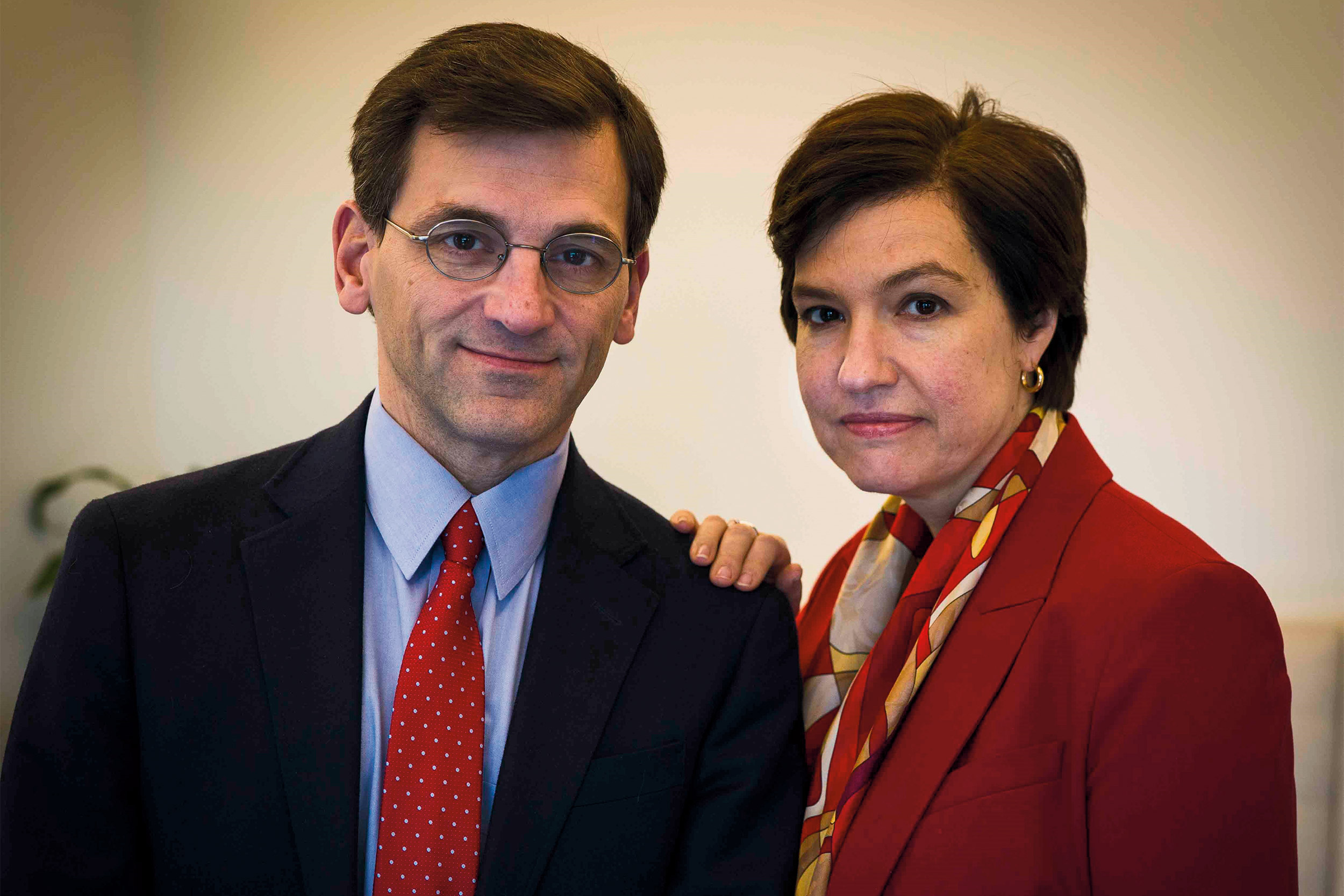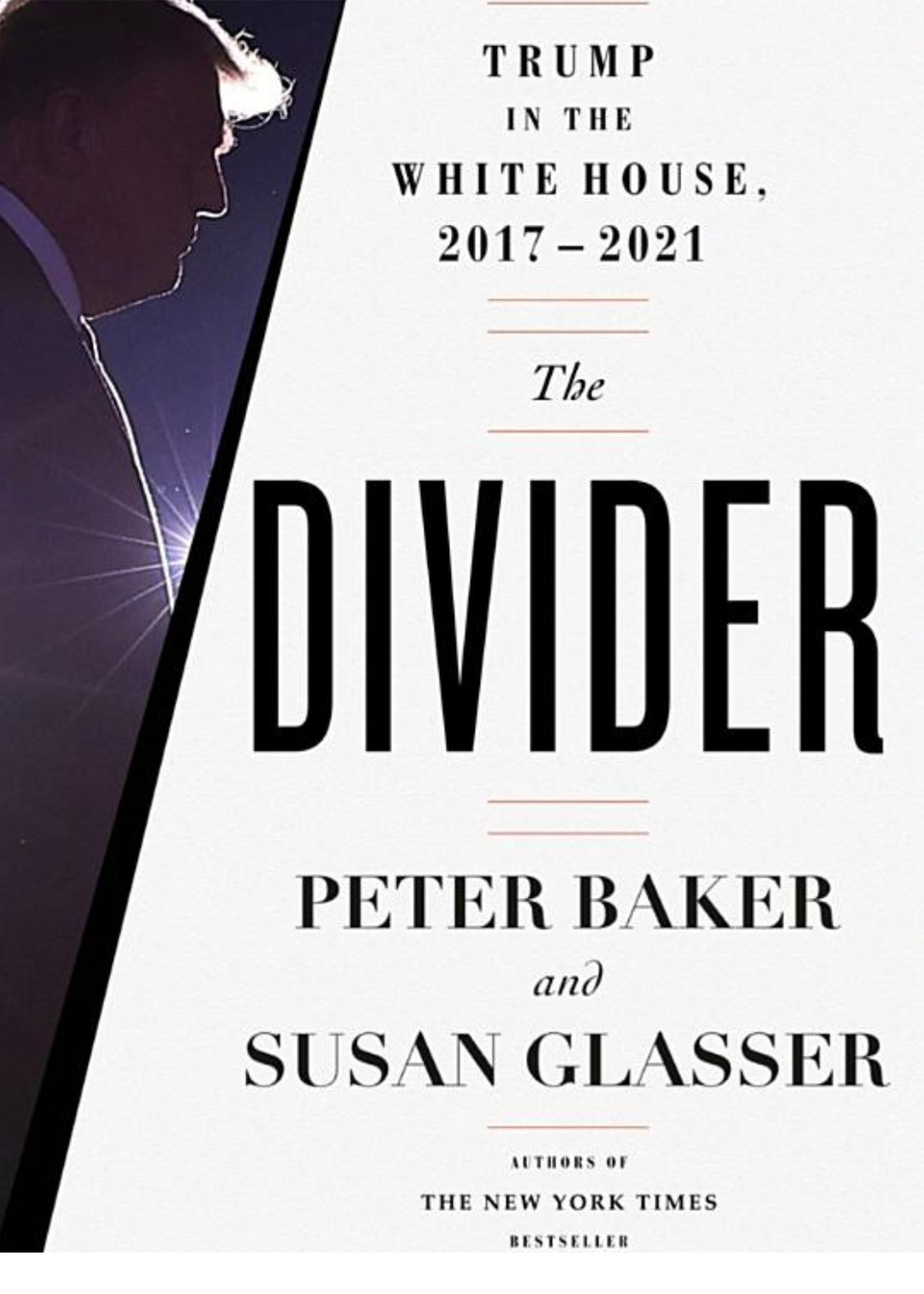
In their new book, “The Divider: Trump in the White House 2017-2021,” Susan Glasser and her husband, Peter Baker, catalog President Trump’s turbulent time in office.
Photo by Doug Mills/The New York Times
No return to Camelot
Veteran Washington journalist Susan Glasser details Trump White House years in new history
In a new book, “The Divider: Trump in the White House, 2017-2021,” Susan B. Glasser, former editor of Foreign Policy and Politico and now staff writer at The New Yorker, catalogs the 45th president’s turbulent time in office in vivid and sharp detail with her co-author and husband, Peter Baker, chief White House correspondent for The New York Times. Glasser, who writes a weekly column on politics, has been covering Washington and U.S. presidents since the George H.W. Bush presidency following her graduation from Harvard College in 1990. She spoke with the Gazette about what she learned. Interview has been edited for clarity and length.
Q&A
Susan Glasser
GAZETTE: During a Jan. 6 Committee hearing last July, Rep. Jamie Raskin referred to “American carnage,” that curious phrase from Trump’s inaugural speech, as almost a forewarning of the upending of so many political institutions, norms, and traditions during Trump’s administration. Was Raskin’s assessment fair?
GLASSER: Absolutely, that’s right on point. We set out to do the book because we felt that it was important to do a full, four-year history in order to show that the catastrophic ending of the Trump presidency in 2020 was not some kind of an outlier, but in many ways, the inexorable, violent conclusion of four years of assault on American institutions. And the “American carnage” inaugural address was such a striking, dark, ominous foretelling in many ways. It was almost as if it was a self-fulfilling prophecy.
GAZETTE: During the last administration there was so much coverage of infighting within the Trump family, the White House, the administration, and, of course, rifts in the country. Why was it so discordant?
GLASSER: “The Divider” works both as an explanation of Trump as a person, as well as a political philosophy. He was very much the divider when he was a businessman in New York. That’s how he ran his company. He seemed to relish pitting people against each other, in his own family, among his aides. Advisers who worked with him described him taking an almost gladiatorial approach to meetings in the Oval Office where he encouraged aides to literally fight it out in front of him. And, of course, that was his political aspiration, as well. There’s this amazing quote from Steve Bannon: “We didn’t win an election to bring the country together.” Imagine any other president having that almost as the motto of their presidency?
GAZETTE: The book closely details the administration’s erratic and transactional foreign policy, how Trump bad-mouthed allies and fawned over autocrats, and how his senior national security aides often had no idea what he was going to do or say when he spoke to other world leaders. National security adviser John Bolton quit after Trump, without warning, invited representatives of the Taliban to Camp David on the anniversary of 9/11. “He was, in effect, a modern-day manifestation of the Madman theory,” you wrote. What did world leaders really think of Trump?

GLASSER: It is a danger when the leader of the world’s major superpower is seen as unpredictable and erratic. International relations thrive in stability, and Trump lives in a permanent state of desire to create disruption and instability, and so that was, in and of itself, a source of great concern among other world leaders. His attacks on allies and undermining of the NATO alliance from within, again, a source of major instability and a permanent weakening of America’s position in the world. Things like withdrawing from the Paris Climate Accord and the Iran nuclear deal really shook confidence in a long-term way. What is the point of making a major international deal with the United States if the country is so divided, that in two years or four years, a new regime will come in and just throw out the agreement of the old? That is a consequence I think you will see hanging over foreign policy for many years to come.
As far as world leaders go, many had Trump’s number. They saw that he was highly susceptible to flattery and to manipulation. His vanity was such that even his vaunted admiration for Vladimir Putin seemed to be a one-way street. We learned for the book that in the summer of 2019, when he met Putin on the sidelines of the Osaka G-20 summit, Trump was bragging, “They love me in Poland; they’re going to name Fort Trump after me. They love me in Israel; they’re going to name a settlement after me.” And Putin sort of drolly says, “Well, Donald, maybe they should name all of Israel after you.” I thought that was such a revealing moment.
GAZETTE: You and Peter spent a decade working in Moscow. What is behind Trump’s apparent admiration of Putin?
GLASSER: His admiration for Putin does long predate his tenure in the White House. Trump even wrote him like a mash note after Putin was named Time’s [Person] of the Year back in 2007. Despite the Mueller investigation and years of smoke around this question, it’s really never been fully investigated or understood what really lies behind it. Both of Trump’s sons, at various points, said publicly that Russia was a major source of financing for the Trump Organization and some, like Michael Cohen, Trump’s former “fixer,” believe that Trump wanted to do business in Moscow and therefore, was sucking up to Putin. Many who worked on the National Security Council with Trump came to conclude it was part of a broader admiration for autocrats and strongmen. According to our reporting, even Dan Coats, the Trump-appointed director of national intelligence, after the Helsinki Summit [when Trump took Putin’s side over U.S. intelligence officials on whether Russia interfered in the 2016 U.S. election], he was so shocked by what Trump did that he told others he thought maybe Putin really did have something on Trump, after all.
GAZETTE: Some senior administration officials have tried to recast themselves as unsung heroes who worked under the radar to prevent greater harms. Did you find in your reporting individuals who seemingly filled that role?
GLASSER: A senior White House official told us, “Look, there were no heroes in the Trump White House.” These are inevitably compromised characters. In many ways, the enablers were the big facilitators for Donald Trump. Without them, he would have just been an old man shouting at the TV in between golf games. But there were certainly some advisers, particularly the nonpartisan national security types, who did see themselves fundamentally as being there to constrain a president who they feared was eager to violate not just norms but laws, and potentially to disrupt national security. And that, as far as I know, is really without precedent — the idea of national security officials who considered the president of the United States himself to be the biggest threat to national security.
In part because he’s continued publicly to mislead people is the story of Mike Pompeo, the secretary of state and Harvard Law School graduate. One of the most obsequious in public of Trump’s advisers and in private, as well. Here’s the interesting thing: He did disagree with Trump on a number of foreign policy issues privately. After the 2020 election, not only was he totally clear in private that there was no rigged election and that Trump was a legitimate loser, but he was so alarmed on Nov. 9, 2020, the first workday after the election was called and the day Trump fired Mark Esper, the defense secretary, and sent over a team of loyalists to the Pentagon, Pompeo called up Mark Milley, the chairman of the joint chiefs, and said he needed to come over right away. At 9 o’clock at night, he sat at his kitchen table and said “the crazies” have taken over. They set up a daily 8 a.m. phone call that they started calling “land the plane” phone calls in order to try to get the country to Jan. 20. And yet, two days after that late-night meeting with Mark Milley, he made a joke at a press conference about “a transition to a second Trump term.” And to this day, Pompeo has never acknowledged his own fears for the country and skepticism about Trump’s election denialism.
That’s the same thing with Jared Kushner, who woke up two days after the election, turned to Ivanka and said, “Honey, I think we should move to Miami.” They both knew that the election was lost and instead of trying to stop Rudy Giuliani and the others who urged Trump on in pursuing his false claims, Jared and Ivanka, who claimed to be such important advisers to Trump, spent their time looking at real estate in Florida. They purchased a $32 million property from Julio Iglesias that they closed on in early December, even before the Electoral College had met on Dec. 14.





